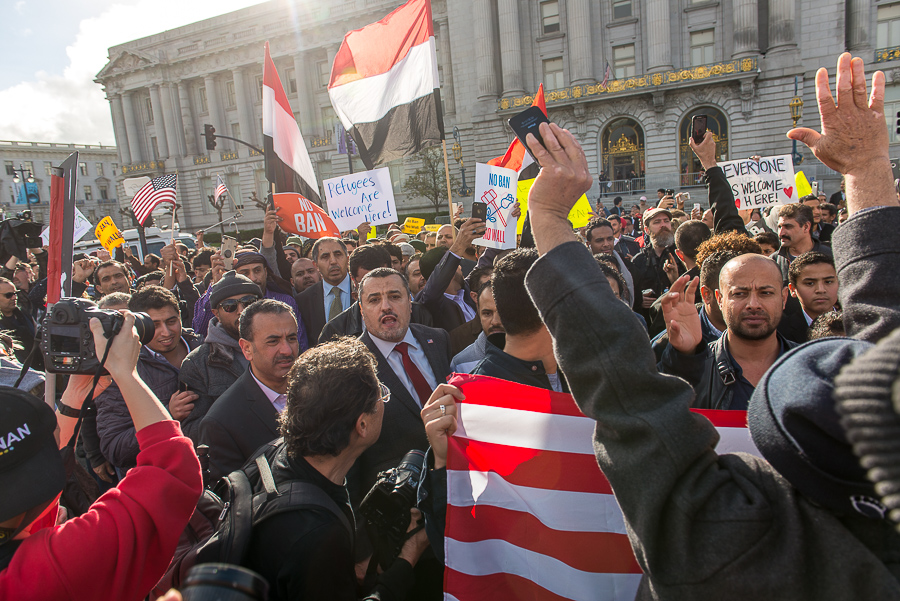
Executive order has immediate consequences for UC Davis community
President Donald Trump signed an executive order on Jan. 27, effective for 90 days, to impose a blanket restriction on the entry of permanent residents and immigrants to the United States with visas from seven Muslim-majority countries: Libya, Iraq, Syria, Iran, Yemen, Somalia and Sudan. In addition to this, the order puts an indefinite halt on the entry of Syrian refugees into the United States.
On Feb. 3 the ban was temporarily halted by Judge James L. Robert of the state of Washington. In conjunction, the U.S. Department of State ordered a reverse on the cancellation of visas revoked in the past two weeks, “so long as those visas were not stamped or marked as canceled,” according to a CNN news report. 60,000 visas were cancelled.
“I am particularly concerned about the denial of free passage to those with valid visas,” said Interim Chancellor Ralph J. Hexter in his statement to the campus community. “This situation touches us closely.”
So far the executive order has affected a number of UC Davis community members, including UC Davis physics professor Mohammad H. Hamidian. While Hamidian possesses dual Iranian-Canadian citizenship, if the ban is reinstated, he will be forbidden from entering the U.S. if he leaves. As a result of this uncertainty, he was forced to cancel plans to attend an academic conference in the Netherlands this month.
“There seems to be some ambiguity as to whether I’d be allowed to return,” Hamidian said in an interview with The Sacramento Bee.
“UC Davis has 87 students or scholars from Iran, Iraq and Libya, with unknown numbers of Iranian faculty, family members and workers with permanent residency living in our City,” said Davis Mayor Robb Davis in his message to the community.
He went on to list numerous cases of international students and scholars who face severe personal and academic consequences because of the order.
Among these, the mayor mentioned an international Ph.D. student who recently obtained his student visa to attend UC Davis in the spring and must now deal with the jeopardized validity of his visa. He also wrote about an international student applying for a master’s program in the UC Davis Department of Engineering, who is now uncertain about whether she should continue working on her application.
On Jan. 29, in the midst of all the protests, UC Davis law students and faculty of the Immigration Law Clinic rushed to the San Francisco International Airport to offer their services to passengers threatened by deportation, as well as families concerned for their detained relatives.
In an interview with ABC News, Sara Ehsani-nia, a second-year UC Davis law student, explained how she worked with the Asian Law Caucus to help release an elderly Iranian couple that was in detention for three days. Several UC Davis faculty and alumni were also preparing to advocate for the detained by accumulating information on their constitutional rights.
“There are people in the community who have lost immediate family members and couldn’t attend their funerals because they have to decide between career development and academics versus their obligations to their family members back home,” said Ellie White, a second-year graduate student in the Department of Civil Engineering.
An anonymous student with a multiple-entry student visa explained how they used to be able to travel out of the country and return easily, but now “there is no clarification regarding that and I believe that no one should ever have to make a choice between their career and family.”
The anonymous student also said that “there are a lot of conferences around the world that we cannot join, because we cannot come back. It used to be the case that you can apply for a new visa as a student or faculty, but for the past week you know that applying for a visa is not an option. Having the option to pack and travel if you needed to is something that can make a huge difference.”
According to White, the ban will also impact the U.S. as a whole.
“Putting this [in] a broader context of what it means for the United States: the effects of this ban will not be readily apparently right now,” White said. “Iran has been known to be dealing with a brain drain and I think now the U.S. is […] dealing with something similar. We’ve heard about a lot of people wanting to move to Canada or finishing their studies elsewhere. These people are productive members of society that are contributing to America and its economy and I feel like this ban is alienating them. There are the personal hardships it’s causing, but it’s also having broader impacts.”
The UC Office of the President, the chancellors of the 10 campuses, Interim Chancellor Hexter and Mayor Davis have all released statements expressing their care and concern for the members of the community from each of the seven nations.
“While maintaining the security of the nation’s visa system is critical, this executive order is contrary to the values we hold dear as leaders of the University of California,” read a joint letter, signed by the UC President and 10 Chancellors. “The UC community, like universities across the country, has long been deeply enriched by students, faculty and scholars from around the world, including the affected countries, coming to study, teach and research.”
Written by: Kimia Akbari — campus@theaggie.org



